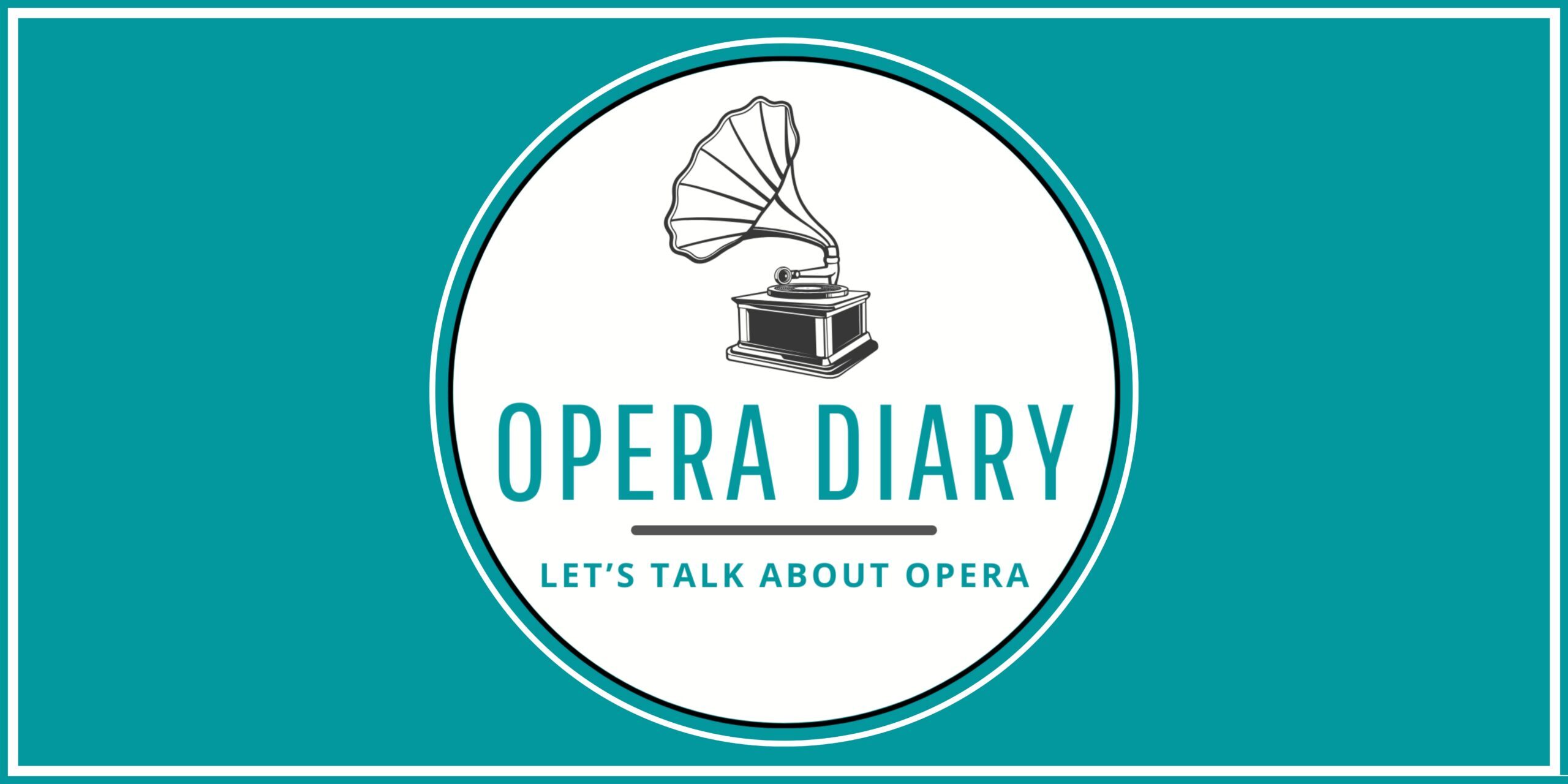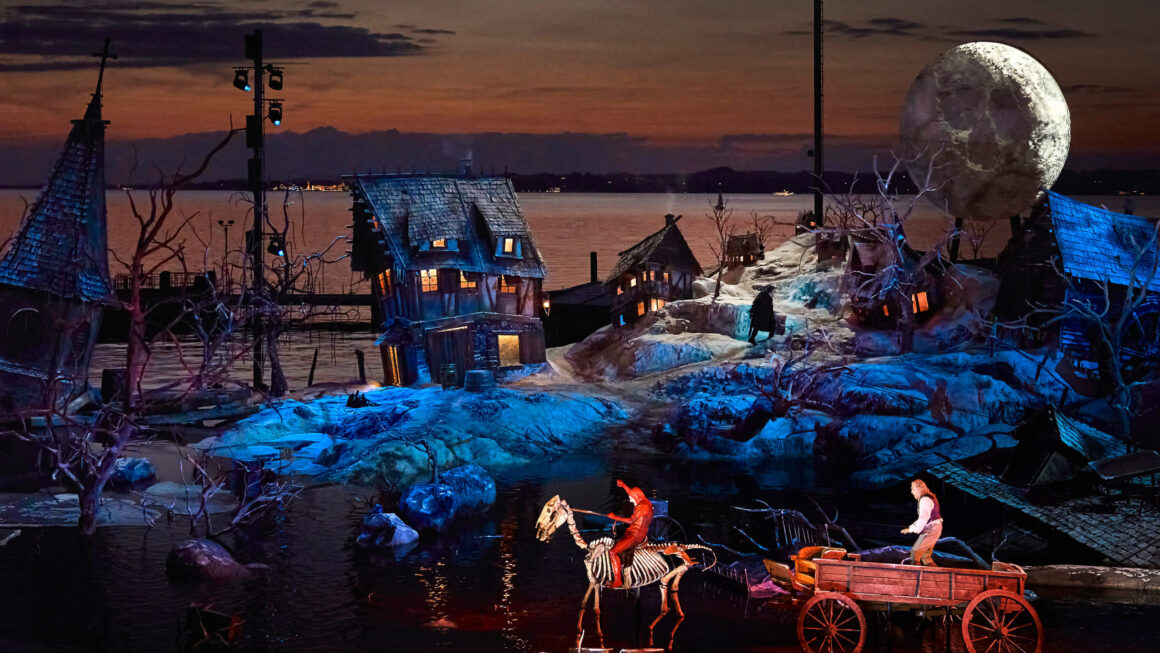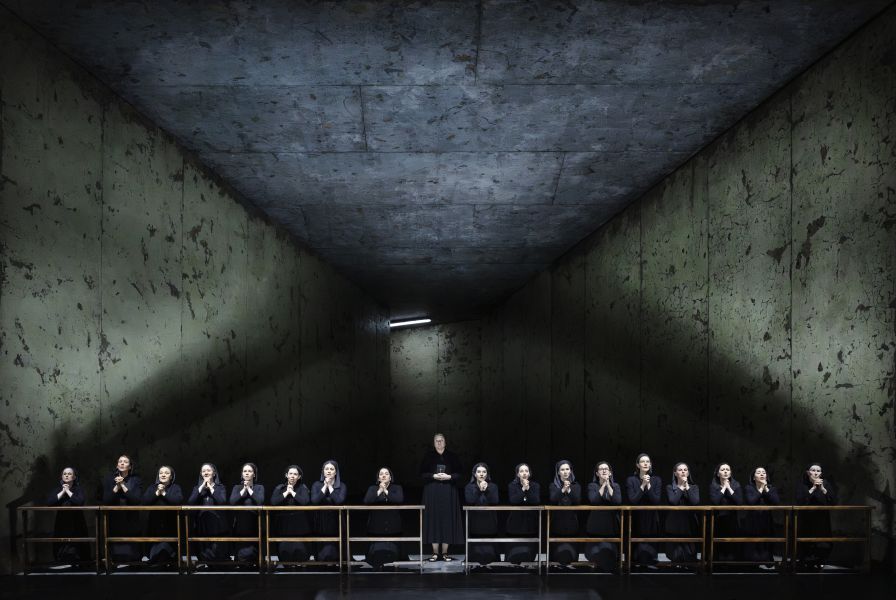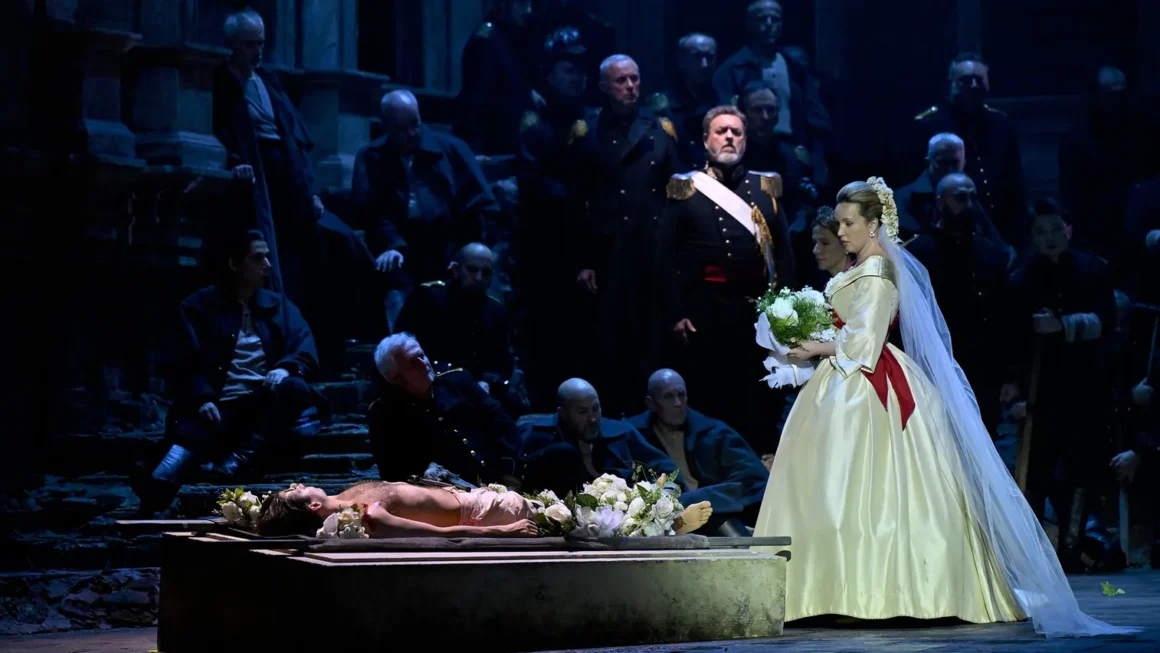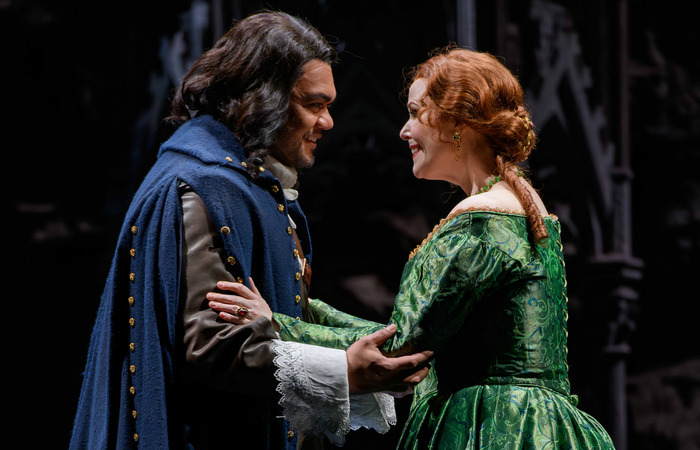By the end of the day, our hopes that it would take place where we had wished were fading. The stifling afternoon heat, a harbinger of meteorological unrest, suggested that the smooth unfolding of the evening was, if not in jeopardy, at least likely to require some adjustments. In the end, through the will and grace of a force we cannot name (much like those that abound in the very work that had drawn us here), the rain miraculously subsided, and the sky even granted us a few rays of light, which helped create a setting as enchanting as the one staged for this third performance of Der Freischütz in Bregenz.
Nearly 1,000 people gather to listen to Weber’s operatic masterpiece – “the most German of composers”, according to Wagner. The emotion is tangible as we reflect upon it. A score written in the first half of the 19th century, contemporary with Spontini’s, and rivalled within the Prussian court, from which forests, hunters, ghosts, maidens and demons emerge. For those nostalgic for a time they never lived, like the author of these lines, it is a moment of profound joy, heightened not only by the beauty of what we are about to see and hear, but also by a sense of justice towards a composer far too seldom performed today, whose repertoire extends well beyond Der Freischütz. May the evening of 19 July inspire those unfamiliar with the richness of his work to explore it further.
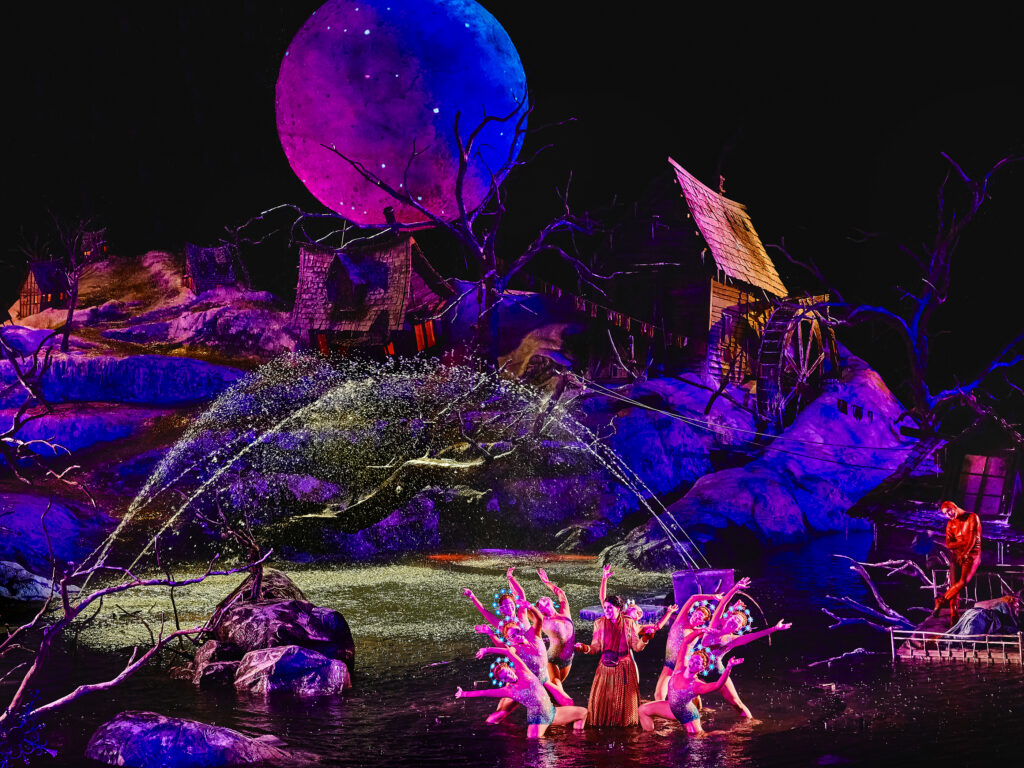
The action unfolds somewhere where snow falls – Bohemia, as the libretto suggests? Perhaps so – to the point of causing the village to collapse. All is in ruins. Philipp Stölzl’s staging delights the eye with the beauty that emerges from destruction. The meticulous attention to countless details commands admiration, all the more so as this singular set undergoes substantial transformations throughout the performance, solely through effects that conjure the depths of hell and the heights of heaven. A spectacle tinged with grandeur, a (super)natural enchantment in service of a tale that intertwines the divine with the profane (superstition pervades it all) even touching on the Mephistophelian.
Such scenic opulence finds its equal in the orchestra pit, where Patrik Ringborg, a true sorcerer of sound, breathes life into the spellbinding score with a Wiener Symphoniker animated by the spirits, landscapes, and emotions of the libretto. Not for a single moment did the evening falter musically: it was pure delight throughout. A masterfully crafted orchestral coherence brought out the exuberant richness of the composition with remarkable brilliance. Let’s also applaud the beauty and power of the Prager Philharmonischer Chor, conducted by Lukáš Kozubík. A true force of nature!
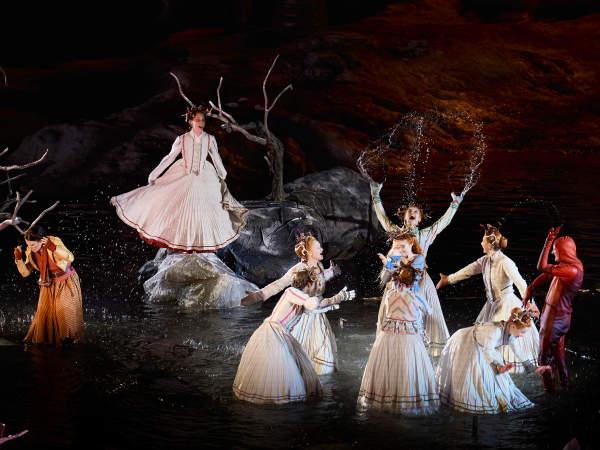
Certain choices inspired less enthusiasm on our part. We shall not linger on these less laudatory aspects, as they do not detract from our overall impression of the production’s beauty. Nonetheless, we deeply regret the decision to intervene so heavily in this Singspiel, which, when preserved in its entirety, including the spoken dialogues, possesses the power to move each and every listener. Of course, such modifications allow for theatrical possibilities absent from the original version – such as the frequent presence of Samiel, portrayed with excellence by Niklas Wetzel – perhaps more immediately grasped by contemporary audiences. Yet who can truly claim the authority to improve upon it in this regard? Creative freedom in staging, which we wholeheartedly welcome and encourage, must never be permitted to distort the narrative, as was regrettably the case at certain moments during the 19 July performance.
With that aside addressed, let us return to the strengths of the evening, beginning with Thomas Blondelle’s debut in the role of Max. There are performers whose vocal and theatrical talent, whose commitment and reverence for the score, make them compelling in any repertoire. He is undoubtedly one of them. His portrayal of Herod in Salome at the Deutsche Oper Berlin had already prompted us to write a panegyric that, in hindsight, may not have been Eulogistic enough for such a consummate artist. Once again, words fall short in praising this tenor, whose vocal and dramatic resources seem boundless. The sensitivity, the shifting inner states, the vulnerability of a psyche under immense strain, all are conveyed without a trace of pathos, and with the suppleness we have come to expect from him. A case in point: his Nein, länger trag’ ich nicht die Qualen, in which not one but all facets of the character emerge with the same ease with which they yield to whatever the score next demands. And what can be said of his Leb wohl!, where tenderness and melancholy rise like a promise (or more than that, a prayer) to Agathe?
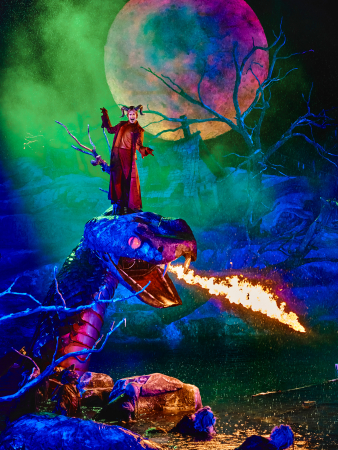
The balance of the work is sustained less by the Max–Agathe pairing than by the compelling dynamic forged with a Kaspar who must be as lugubrious and shadowy as Thomas Blondelle’s Max is delicate and luminous. Count on David Steffens, at the height of his powers, to bridge these two poles with a voice of profoundly sepulchral timbre, sending shivers down the spine as he brushes the lowest notes of a tessitura sculpted with the finest detail. His aria Schweig’, schweig’ – damit dich niemand warnt! (enough to make a corpse shudder) stood out as one of the evening’s most powerful moments. A regal bass, a master of diction, and the perfect embodiment of the surly outcast cursing all and everything, he nonetheless lends the role a certain gravitas, thanks to his subtle, measured acting, which allows for a touch of mischief (as in his Eins ist eins, und drei sind drei!). But the undeniable pinnacle of a performance we cannot praise enough is his chilling Schütze, der im Dunkeln wacht, which initiates the ritual of forging the seven magic bullets, encircled by fire. Gripping, there is no other word for it, from beginning to end.
Agathe is portrayed by Anne-Fleur Werner, whose timbre may perhaps be a touch too full-bodied for this character (a more crystalline – and less interrupted – Wie nahte mir der Schlummer would have been more welcome). Yet all her other qualities are undeniably present: a fine breath control, agility, and nuanced phrasing that lends credibility to Agathe’s sometimes overly innocent nature. These contribute to a touching performance, particularly in her duet (Schelm! Halt fest!/ Lass das Ahnenbild in Ehren!) with Mirella Hagen’s commanding Ännchen. The arietta Kommt ein schlanker Bursch gegangen is a pure delight. She soars effortlessly into the upper register, only to return to a lower middle range of disarming candour, never overly rich, so as not to overshadow the emotional beauty of a profoundly moving vocal line.
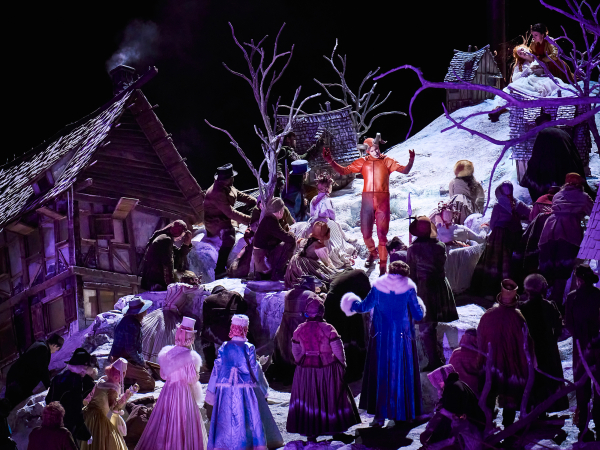
Now to Michael Borth’s Killian. A true stage actor, the baritone brings a theatrical flair that enhances the production’s humour, displaying great panache, particularly in his Act I entrance. Franz Hawlata lends life to a Kuno who, to our taste, leans a little too much toward the hermitic (a role already reserved for… the Eremit, portrayed with valour by Frederic Jost), yet remains endearing in his brief appearances. Pomp, luxuriance, and exuberance are delivered in full with the thunderous entrance of the excellent Johannes Kammler as Ottokar, accompanied by his court: a moment we relished for its comic and hilarious tone, admittedly unexpected, but all the more welcome at that point in the opera.
Though we did not embrace every interpretative choice in this reading of the story, the number of strengths far outweighed those elements that left us wanting. Der Freischütz is certainly not Weber’s most accomplished opera (do listen to his Euryanthe…), yet it lends itself to a wealth of possibilities as varied as the themes it contains, offering the audience a dazzling palette of Weberian musical language, and more than that, a vivid expression of German Romanticism – which, we are certain, touched many among those present on this summer evening in Bregenz, where the possibility of enchantment and wonder has rarely felt so accessible.
::::::::::::::::::::::::::::::::::::::::::::::::::::::::::::::::::::::::::::::::::::::::::::::::::::::::::::::::::::::::::::::::::::::::::::::::::::::::::::::::::::::::::::::::::::::::::::::::::::::::::::::::::
DER FREISCHÜTZ
Opera in 3 acts by Carl Maria von Weber
Libretto by Friedrich Kind, based on a tale from the Gespensterbuch by Johann Apel and Friedrich Laun
Premiered in Berlin on 18 June 1821
Patrik Ringborg | Direction · Lukáš Kozubík | Choir direction · Philipp Stölz | Staging and scenography · Eric Ruff | Scenography · Gesine Völlm | Costumes · Florian Schmitt and Philipp Stölz | Lights
Cast: Anne-Fleur Werner | Agathe · Mirella Hagen | Ännchen · Thomas Blondelle | Max · David Steffens | Kaspar · Franz Hawlata | Kuno · Michael Borth | Kilian · Frederic Jost | Ein Eremit · Johannes Kammler | Ottokar · Niklas Wetzel | Samiel · Wiener Symphoniker · Prager Philharmonischer Chor · Credit photos: ©Bregenzer Festspiele/Anja Köhler.
(For further informations) Link to the Bregenzer Festspiele: Der Freischütz (2025 production)
